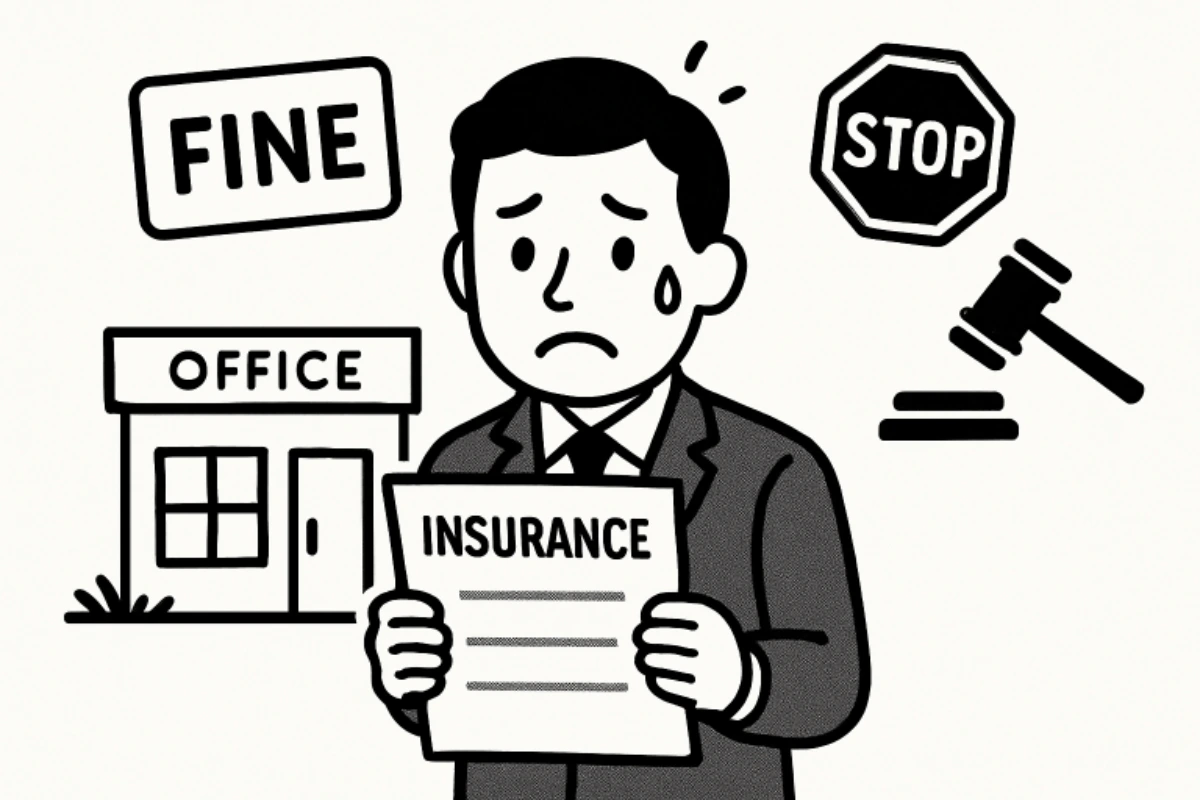Key Takeaways
- Operating without workers’ compensation insurance exposes employers to legal, financial, and operational risks.
- Consequences include severe fines, criminal penalties, stop-work orders, and exposure to lawsuits.
- The specifics of penalties and enforcement can vary significantly depending on state requirements.
- Adhering to insurance requirements protects both employees and businesses.
Introduction
Workers’ compensation insurance serves as a safety net for businesses and their employees, providing vital protection in the event that a worker suffers a job-related injury or illness. Employers are legally required to carry this coverage in almost every state, with exceptions being exceedingly rare. The consequences for failing to comply are both immediate and long-lasting for employers, jeopardizing organizational stability. Understanding the real risks associated with skirting this responsibility—especially in highly regulated areas like California workers’ comp rates can directly impact operational costs—helps business owners make informed decisions that safeguard their operations and personnel.
When businesses neglect to carry proper workers’ compensation insurance, they do not simply risk monetary penalties; they put their entire business infrastructure at stake. Insurance isn’t just a formality—it’s an essential risk management tool that supports the well-being of both employees and organizations during unexpected workplace incidents. The lack of adequate coverage undermines employee trust and can have ripple effects on morale, productivity, and workplace safety. From mounting legal liabilities to potential reputational damage in the community and industry, the fallout for non-compliant employers can be devastating, potentially threatening the survival of the enterprise itself.
The law provides multiple mechanisms to ensure compliance, ranging from state-level monitoring and unannounced audits to aggressive enforcement actions for violators. Regulatory agencies take compliance seriously, as evidenced by the frequency of investigations and enforcement campaigns targeting high-risk industries.
Employers who fail to provide mandatory workers’ compensation insurance are immediately at risk of significant legal penalties. In states such as California, non-compliance is not merely a civil offense—it is a criminal one, often classified as a misdemeanor or even a felony, depending on the case. Offending employers may be subject to fines of up to $10,000, imprisonment for up to one year, and additional penalties of up to $100,000. These sanctions underscore the seriousness with which regulators view the failure to secure employee coverage (California Department of Industrial Relations). Penalties can also include license suspension or revocation, which can have immediate operational consequences for the business.
Legal Penalties for Non-Compliance
Employers who fail to provide mandatory workers’ compensation insurance are immediately at risk of significant legal penalties. In states such as California, non-compliance is not merely a civil offense—it is a criminal one, often classified as a misdemeanor or even a felony, depending on the case. Offending employers may be subject to fines of up to $10,000, imprisonment for up to one year, and additional penalties of up to $100,000. These sanctions underscore the seriousness with which regulators view the failure to secure employee coverage (California Department of Industrial Relations). Penalties can also include license suspension or revocation, which can have immediate operational consequences for the business.
Prosecutors may also file charges not only against the business entity but also against its owners or managing executives, making personal liability a significant concern. The specter of criminal charges can result in lengthy legal battles, costly court appearances, and the profound stress of facing potential jail time. These legal troubles can also affect other areas of a business, such as qualifying for loans or securing government contracts, due to the diminished standing of a business associated with criminal conduct.
Financial Repercussions
Beyond the legal ramifications, the financial consequences for employers can be crippling. Uninsured employers become directly liable for all medical expenses, rehabilitation costs, and wage replacement benefits owed to injured employees. This means that a single workplace accident can result in tens or even hundreds of thousands of dollars in out-of-pocket costs. In Arizona, for example, authorities may demand repayment for all benefits extended to employees, with a penalty of 10% of those benefits or $1,000, whichever is higher (Arizona Industrial Commission). The cumulative effect of these expenses can swiftly drive small businesses to insolvency, especially those operating on thin margins.
Additionally, uninsured employers may struggle to secure contracts or maintain vendor relationships, as many companies require evidence of insurance before doing business. The inability to show proof of compliance can make it nearly impossible to grow or maintain a business in today’s interconnected economy. Business partners and clients may view a lack of coverage as a sign of poor risk management, which can weaken the company’s competitive position in the market.
Operational Disruptions
Regulatory authorities can issue stop-work orders to businesses found to be operating without the required insurance. These orders force a halt to all activity until adequate coverage is acquired, resulting in an immediate—and potentially prolonged—loss of revenue. For many companies, these interruptions are not only financially damaging but can also erode customer trust and brand reputation. These operational disruptions are enforced vigorously by state departments, such as the Minnesota Department of Labor and Industry. Restarting operations can also involve significant administrative hurdles, including new inspections, application processes, and reestablishing relationships with clients or vendors who may have moved on.
Operational disruptions don’t just impact the bottom line; they often disrupt employee livelihoods, contributing to workforce dissatisfaction and high turnover. When operations are suspended, employees may be forced to seek work elsewhere, causing businesses to lose skilled and experienced staff who can be difficult or costly to replace.
Increased Liability Exposure
A less-discussed, but exponentially more significant, risk for uninsured employers is increased legal exposure. Without workers’ compensation coverage, employers forfeit certain legal defenses that would otherwise shield them from personal injury lawsuits brought by employees who have been injured. In these cases, employees are empowered to sue for damages exceeding what standard workers’ compensation would allow, including pain and suffering and punitive damages. Verdicts in such lawsuits can outpace workers’ comp settlements by wide margins—posing an existential threat to the business and individual owners (Peter Thompson & Associates). Many courts hold uninsured employers strictly liable for workplace injuries, meaning the employer has little to no recourse in court, making outcomes highly unpredictable and costly.
The risk of litigation can also drive up legal bills, consume management time, and lead to prolonged public scrutiny—all of which detract from core business operations. Some business owners have been forced to sell off assets or declare bankruptcy solely due to the costs associated with legal settlements related to employee injuries.
State-Specific Variations
While the underlying principle of workers’ compensation insurance is consistent nationwide, state-level enforcement and penalties for non-compliance vary significantly. In New Jersey, for instance, each infraction can result in fines of up to $5,000 for the first 20 days and an additional $5,000 for every ten days of ongoing violation (New Jersey Department of Labor and Workforce Development). Texas, meanwhile, is unique in allowing private employers the option to opt out of the state workers’ compensation system; however, those who do face even greater civil liability exposure if an employee is injured.
Employers must be aware of their unique obligations, which vary based on their business geography and industry classification. States frequently update and revise penalties, especially in response to recurring compliance issues. Business owners should seek regular updates from state labor departments, professional legal resources, or trade associations to stay informed and avoid costly surprises.
Final Thoughts
Maintaining workers’ compensation insurance is a non-negotiable aspect of operating a legal and responsible business in the United States. From the hefty financial burdens of injury claims and legal settlements to the disruptions of stop-work orders and damage to reputation, the risks far outweigh any premium savings realized by attempting to skip coverage. Penalties for non-compliance can put the most established businesses at risk, and the combined impact on finances, operations, and employee morale is often irreversible.
Employers should regularly review their insurance policies, stay informed about changing state regulations, and prioritize the well-being of their workforce through compliance. Ensuring robust workers’ compensation coverage is an investment not only in legal compliance but also in the long-term stability and growth of your business. Building a culture of safety and responsibility pays dividends in productivity, financial efficiency, and community goodwill, making compliance with workers’ compensation laws a cornerstone of sustainable business success.





